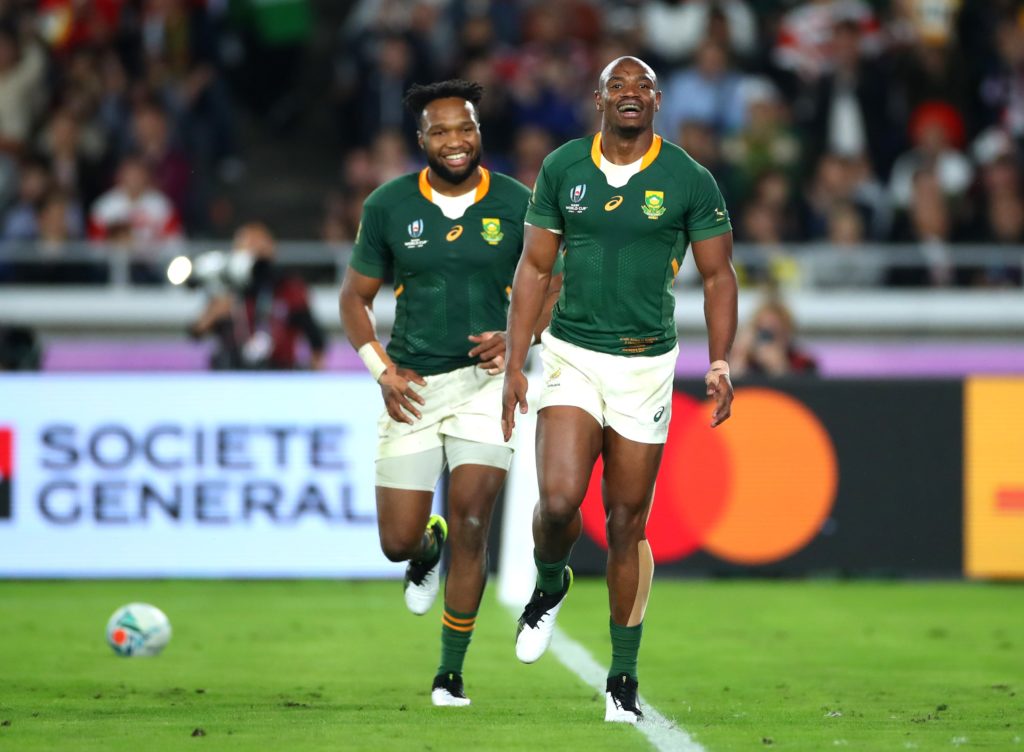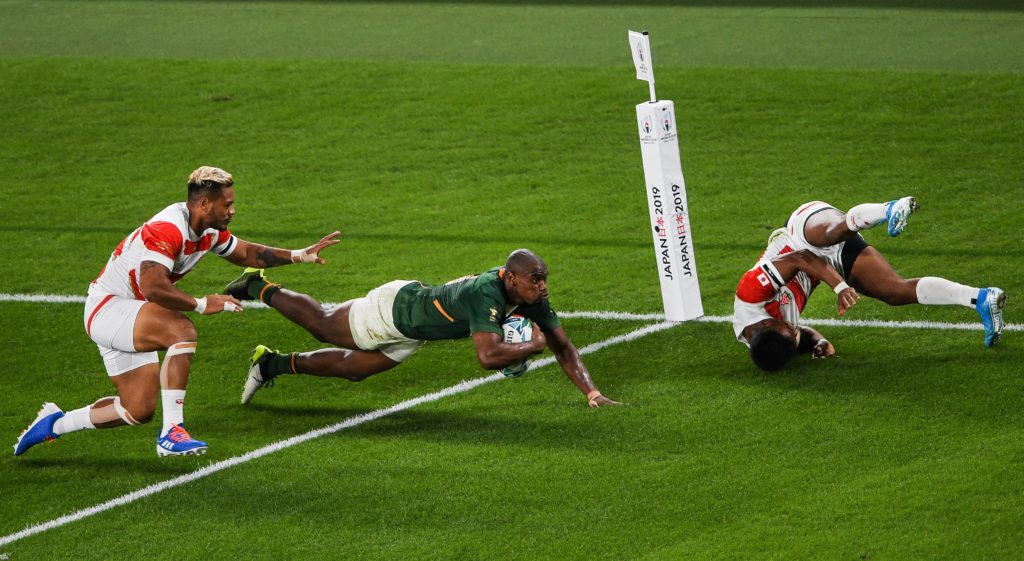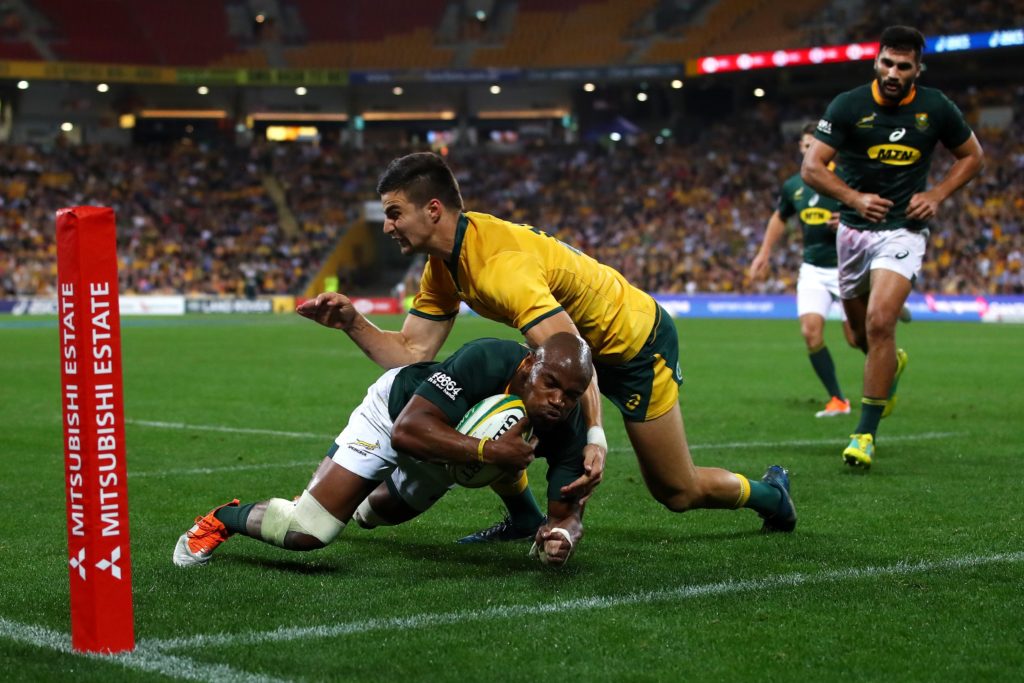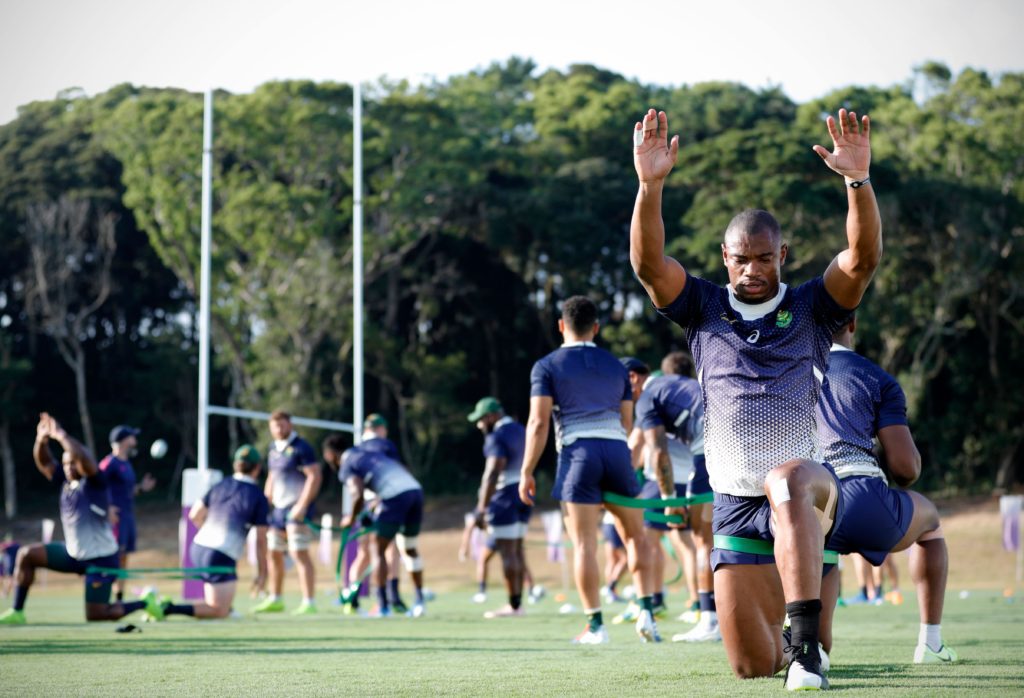Rassie Erasmus is not one given to public displays of emotion. And yet, when the World Cup-winning coach was asked recently to give an account of Makazole Mapimpi’s heartbreaking story, the damn wall well and truly broke.
Erasmus wiped at his tears, rocked in his chair and then looked skywards. Is there any reason why some of us are forced to endure such horrors before we realise our potential? Erasmus wept openly as he spoke about Mapimpi’s journey on Chasing the Sun – a documentary that charts South Africa’s 2019 World Cup campaign in fascinating detail.
The late Xhosa commentator Kaunda Ntunja – a former SA Schools captain and himself a son of the Eastern Cape – observed that the the first try-scorer for South Africa in a World Cup final is a player “who came from the most hopeless situation in the history of Springbok rugby”. Erasmus put that situation into perspective when he expanded on the story about the photographs that were embedded on each of the players’ jerseys last season. Whereas other players provided several images of family members for this purpose, Mapimpi – who grew up without a father in the rural village of Tsholomnqa and went on to lose his mother, brother and sister – supplied just one of himself.
“I asked him, ‘Why are you doing this?’ and he said ‘I’ve got nobody’,” Erasmus revealed. “Obviously he plays for South Africa… But he doesn’t play for one thing. He just has a massive, massive heart.”
Mapimpi didn’t go to a prestigious rugby school or represent Border’s Craven Week team. As recently as five years ago, he would laugh when coaches and friends at his club said that he might make it as a professional rugby player.
His hard work was rewarded, however, and he made the step up to Super Rugby via the Southern Kings in 2017. Opportunities with the Cheetahs and Sharks followed. He took his bow for the Boks in 2018, and by the end of that season Erasmus was adamant that Mapimpi was South Africa’s most improved player.
When we spoke early in 2019, Mapimpi told this writer that he was already a hero in his own community. While he wanted to represent South Africa at the World Cup in Japan, he gave the impression that he had exceeded his own expectations by representing the Sharks and Boks in 2018.
Perhaps he felt that his story – certainly no fairytale – already had its happy ending. Little did he know that there would be more chapters, and that each would be better than the last.
On the back of the Boks’ World Cup success in 2019, Mapimpi secured a contract with the Red Hurricanes in Japan. Barring injury, he should feature against the British & Irish Lions in the Test series next year.
Those who are close to me, like Lukhanyo Am and coach Mzwandile Stick, know where I come from. They know my situation. When I told my teammates about my family history, they were at first confused and then very worried about me.
Through his Mapimpi67 campaign, he continues to raise awareness about gender-based violence in South Africa. The cause is close to his heart and he maintains that the issue will not be resolved overnight.
Many have lauded his remarkable rise against adversity. And yet, there was a time when few people – including those within the Springbok group – were fully aware of his family situation.
Erasmus first confronted Mapimpi about the photo on the back of his jersey in mid-2019. After the Boks drew 16-16 with the All Blacks in Wellington. Mapimpi took the opportunity to stand up in front of the team and tell his story.
“Those who are close to me, like Lukhanyo Am and coach Mzwandile Stick, know where I come from. They know my situation. When I told my teammates about my family history, they were at first confused and then very worried about me,” Mapimpi explained to The XV.

Stick grew up in the New Brighton township just outside Port Elizabeth. He later became Springbok Sevens captain and led the team to 2008/09 World Series title. More recently, he served as South Africa’s assistant coach.
“We wanted to do something special for the players and their families,” Stick said of the idea to feature photos on the team jerseys. “The players were away from home for most of 2019, and for two months straight over the World Cup. We wanted the players to have the opportunity to carry their loved ones with them when they were on the field. At the same time, we wanted the family members to know how much we respected the sacrifices they’d made over the course of this journey.
“So when it came to Makazole…he’s been through so much in terms of losing family members over the years. For many of us who come from tough backgrounds, we know about those realities and others such as not having cameras to take photos. But Makazole has been through more than most.”
Mapimpi told the team why his own photo was on the back of his jersey. The details of his childhood go a long way to explaining why he is currently using his platform to fight gender-based violence.
I grew up with my gran, sister and cousin. I was the only man in the house. Nobody told me how to behave in terms of right and wrong. I had to figure out a lot for myself. I didn’t have good male role models in my life
“My mom passed away when I was 14,” he stated matter-of-factly. “Then I lost my brother and my sister. I lived in a village where pictures weren’t a big thing. I didn’t care about things like that, so I didn’t have any.
“I grew up with my gran, sister and cousin,” he continued. “I was the only man in the house. Nobody told me how to behave in terms of right and wrong. I had to figure out a lot for myself. I didn’t have good male role models in my life.
“The things I saw… there were people who tried to abuse my sister. My neighbour would help me when I was without food. Later, once I was starting to get a chance as a rugby player and was away for a game, I found out that my neighbour had been raped. The guy who raped her was the same age as me.
“It was the kind of environment we grew up in, you would see other men treating women that way, abusing them. Some boys would pick up on that and grow up to do the same.”

Stick believes that the manner in which Siya Kolisi, Mapimpi and others have risen above their circumstances will give people in similar situations hope. Mapimpi’s campaign against gender-based violence highlights a greater purpose beyond the game.
“We try to encourage players to focus on rugby, but I guess that’s easier said than done for some of these individuals,” said Stick. “Makazole managed to take all of those negatives in his life and turn it into a positive. He’s made a career out of rugby, he’s become one of the best players in the world, and he’s gone further to show how much he has grown as a human being.
“You see how many players are taking responsibility in these troubled times. They’re going out of their way to help and make a difference. They’re standing up for various causes.
“That’s what’s needed, someone to speak out for those who can’t. We need to protect our women. These are the people that raised us and cared for us. How can we as men turn our back on them?”
Mapimpi was deeply affected by the rape and murder of 19-year-old student Uyinene Mrwetyana at a post office in Cape Town last year. In the moments leading up to the World Cup warm-up game against Japan, Mapimpi printed ‘NENE RIP’ on his wrist-strapping in bold black ink. The message served as a tribute to Uyinene ‘Nene’ Mrwetyana as well as a call to action against gender-based violence in South Africa.
I eventually started to think, how can I make people sit up and take notice about what’s happening in South Africa? It’s easy to make a statement on social media. I wanted people all over the world to receive the message.
Mapimpi set out to grab the attention of the camera – and ultimately the attention of millions watching the broadcast around the world. He knew that he had to score a try. In the end, he scored three.
“There was a lot of talk about that incident at the time,” Mapimpi said more than a year after the event .”When I heard about it, it went straight to my heart. I understood what that family was going through. I also understood that it was happening all over South Africa.
“I eventually started to think, how can I make people sit up and take notice about what’s happening in South Africa? It’s easy to make a statement on social media. I wanted people all over the world to receive the message.

“The only way that was going to happen was if I scored a try and showed my wrist to the camera. So I said to myself, look, you need to work harder than you ever have before to get into that position.”
Mapimpi reiterates that his own experiences as a youngster have shaped his decision to make a difference.
“I witnessed that abuse in my village and felt powerless to do anything about it. As things started to happen for me in rugby, I felt that I had more of an opportunity to make a change.
Gender-based violence didn’t stop when we won the World Cup. It’s happening right now in South Africa. Perhaps it’s not easy for some people to talk about, but it’s a conversation we have to have. It’s not going away unless we make a change.
“We have to protect our sisters from this. We have to protect our families. It could be your mother or sister. Everybody has a responsibility to stand against it. It will take a long time to force a change in our society, and I’m up for that fight.
“Gender-based violence didn’t stop when we won the World Cup. It’s happening right now in South Africa. Perhaps it’s not easy for some people to talk about, but it’s a conversation we have to have. It’s not going away unless we make a change.
“Wherever I go, I share my story and some of the details may come as a shock to the person who’s listening, but it’s important. I have to make sure that people know what’s happening.”
Currently based in Japan, Mapimpi continues to receive a stream of reminders about the 2019 World Cup. He did manage to watch the recent documentary and was touched to see that Erasmus shed a tear on his behalf.

“I do get emotional looking back on those moments,” Mapimpi said. “People send me those clips on a daily basis. I can’t help but watch them over and over. It was a very special time for me.”
The Boks pulled out of the Rugby Championship recently due to concerns around Covid-19 and a lack of adequate preparation. SA Rugby plans to stage a series of Tests in early 2021 as they build towards the all-important matches against the British & Irish Lions.
“Everyone wants to be part of that, so there will be a lot of competition for places,” Mapimpi said. Since the 30 year-old moved to Japan, young wingers such as Kurt-Lee Arendse and Madosh Tambwe have caught the eye in Super Rugby Unlocked. Aphelele Fassi will be an option when he returns from a long-term injury. South Africa aren’t short on experienced back-three players either, when one recalls that Mapimipi, Cheslin Kolbe, Willie le Roux, S’bu Nkosi and Warrick Gelant were all at the World Cup.
“I was 19 the last time the Lions came to South Africa. At that stage, I didn’t think that I would make it as a Currie Cup player,” Mapimpi said.
“To be in this position now, to have the potential to face the Lions…it is beyond my wildest dreams. I need to work hard and then grab any opportunity I receive with both hands. ”
Makazole Mapimpi knows no other way.
If you’ve enjoyed this article, please share it with friends or on social media. We rely solely on new subscribers to fund high-quality journalism and appreciate you sharing this so we can continue to grow, produce more quality content and support our writers.



Comments
Join free and tell us what you really think!
Sign up for free